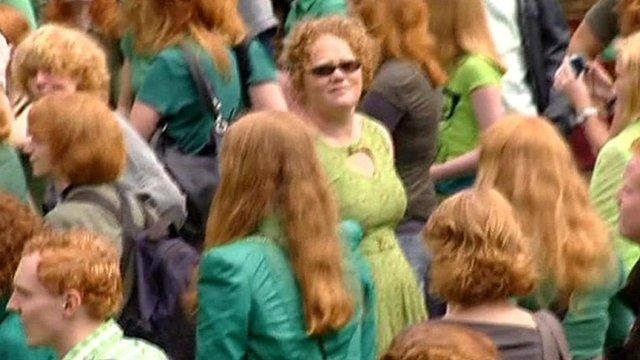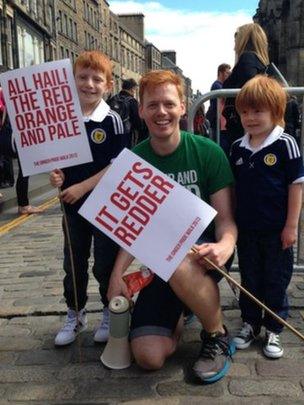Seeing red: Does 'gingerism' really exist?
- Published

In Scotland, about 13% of the population is thought to be ginger - approximately 650,000 people
If you, like me, were born with red hair, the chances are you grew up experiencing all manner of creative name-calling.
"Irn Bru! Carrot top! Ginger minger! Duracell!"
Even former equalities minister Harriet Harman got in on the act in 2011, when she called Lib Dem MP Danny Alexander a "ginger rodent".
Does so-called "gingerism" really exist?
Now Edinburgh's copper tops have decided enough is enough, and taken to the streets to march for Ginger Pride.
But is "gingerism" really that serious?
Singled out
Among the hundred or so red heads at the march was Fiona Inglis from Edinburgh.
She loves her ginger hair now - but says school was a different matter.
"You don't want to be singled out, and having bright orange hair you definitely feel different," she said.
"That Prodigy song Fire Starter was a nightmare! I remember at school walking into the library and all the sixth years bursting into song with 'I'm a fire starter, twisted fire starter'.
"It's almost like ginger is a bad word. It's like any discrimination really. It's just picking on people, and it's not right."
Laura-Ann Horne from Stirling said she came to the march because her nine-month-old daughter Ivy has red hair.
She said: "My experience growing up was horrible. As a teenager, it was quite hard to live with - the names you get are things too rude to say.
"I do worry about it for my children. Hopefully by the time Ivy goes to school it will be less of a problem."
Serious message
According to the ScotlandsDNA project, only about 0.6% of the world's population has red hair.
In Scotland, the figure is thought to be about 13% - approximately 650,000 people.
The Edinburgh Ginger Pride rally was organised by Canadian comedian Shawn Hitchins, who is performing his show, Ginger Nation, at the Edinburgh Festival.
There's no doubt it has generated valuable publicity for him: a large gaggle of photographers and journalists turned up for the march. Gingers make good pictures.
And he's not the only one cashing in on the ginger gene.
Later this month dozens of gingers will take to the skies as Flybe attempts to break an unofficial record for "most redheads on a plane". Even the crew will be redheads.
Irn Bru have run a series of ginger-themed advertising campaigns.

Comedian Shawn Hitchins organised the 'Ginger Pride' march
But Hitchins insisted there was a serious message behind his stunt.
"Gingerism does exist, people do experience bullying, and people do feel discriminated against," he said.
"They are very few and far between in Canada, so for me it was one more thing that added to my sense of isolation as a gay kid.
"It was that one more thing where I felt I just don't belong."
And there have been reports of incidents where "gingerism" has gone beyond a bit of name-calling.
In 2007, a family from Newcastle, external said they were forced to move home by a gang who targeted them over their ginger hair.
Kevin and Barbara Chapman said they and their four children endured more than three years of taunts, smashed windows, graffiti and violence.
"The abuse we get is unbelievable," Mr Chapman said at the time.
"They've been punched and kicked and thrown over a hedge. Every time they go out these gangs get to them."
'Ginger and proud'
But not everyone with red hair has had such a bad experience.
Back at the march, crowds of tourists gathered to take photographs of the flame-haired procession up the Royal Mile.
Heather Hughes from Paisley was among those waving a Ginger and Proud banner. She said she has always loved having red hair.
"My family were always saying 'your hair's fantastic', or you'd get little old ladies coming up to you in the street, so I've always loved it.
"There was picking on, but I think it makes you tough. If I was a brunette, I'd probably be a very shy brunette, as opposed to a very loud ginger.
"I'll definitely be here again, it was fantastic."
Next year, Hitchins promises the march will be even bigger - and even redder.
- Published10 August 2013
- Published7 November 2012
- Published21 September 2011